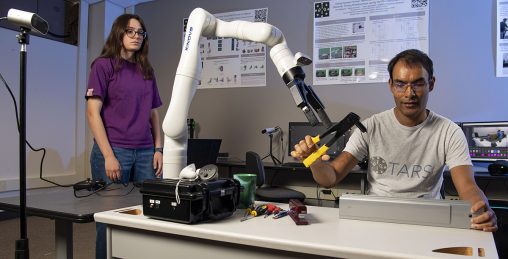 Two Wright State professors have received a big grant to investigate how AI can transform metal recycling and manufacturing. The university hopes to be a national leader in this developing concept.
Two Wright State professors have received a big grant to investigate how AI can transform metal recycling and manufacturing. The university hopes to be a national leader in this developing concept.
They call it “recyclofacturing.” Sean Banerjee and Natasha Banerjee were awarded nearly $3 million last month from the National Science Foundation for this idea. This is the second-largest NSF research grant that Wright State has ever received.
The idea is to create a system for people to request specific parts from a dashboard of multiple recycling plants.
If a plant has the raw material, a trained worker can fabricate the scrap metal into the needed shape and dimensions. The product design will be created by a trained AI model developed by the research team. Undergraduate and graduate students will assist them during the four-year grant period.
Scrap metal can come from old household items such as refrigerators, washing machines and grill lids.
“Traditionally, what would happen is [the scrap metal] might get crushed at the recycling facility and perhaps sent overseas for further processing,” said Natasha Banerjee, associate computer science professor.
Wright State University will be the leading institution for the research, but they’ll have the help of additional schools, including Santa Clara University, Chapman University and Clarkson University.
The Banerjees are in the process of procuring equipment to kick off their research. According to Sean, they’re in this project for the long-haul.
“Our vision is we come up with the blueprint at the end of the four years, we make it public. [If] anyone wants to pick it up, they can pick it and they can realize this, whether this is [in] Ohio…at the U.S. scale, or beyond.”
The hope is that this network can revitalize small manufacturers in the U.S., Sean said.

 Walking through open doors
Walking through open doors  Adventures await
Adventures await  Wright State to expand nursing facilities to meet workforce needs and prepare more graduates for in-demand careers
Wright State to expand nursing facilities to meet workforce needs and prepare more graduates for in-demand careers  Wright State student-athletes make a lasting impact on local family with more to come
Wright State student-athletes make a lasting impact on local family with more to come  Wright State names Rajneesh Suri dean of Raj Soin College of Business
Wright State names Rajneesh Suri dean of Raj Soin College of Business 